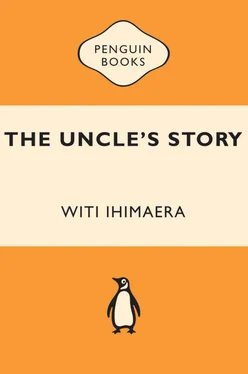I returned the korero to Roimata. She caught it and continued it in an unbroken line.
‘The past is not behind us,’ she said. ‘It is before us, a long line of ancestors to whom we are accountable and with whom we have an implicit contract. There is no future for indigenous people unless you obtain your sovereignty. This is the lesson we have learnt in our country. Maintain your sovereign goals, do not let go of your inspiration, hold to your strength. Remember your warrior spirit.’
Then for the final time she placed the korero in my hands. I looked to the south. I looked to the north. I looked to the west. I looked to the east. I looked at Albert Pentecost, hoping he would understand.
‘If you must bow your heads, let it be only to the highest mountain.’
For a moment there was silence. Then a moan which I first mistook for anger. But people were standing, and the applause was like the waves of the sea. Roimata came forward and took my hand. She was exhausted. It was true, what the old people said — in giving of your own life there was a corresponding diminution of it.
‘We’ve done our job,’ she said. ‘Now let’s get out of here.’
Immediately we were retreating with a haka.
‘Turuki turuki! Paneke paneke! Turuki turuki! Paneke paneke!
‘Tenei te tangata puhuruhuru nana i tiki mai whiti te ra!
‘A haupane, kaupane! Haupane, kaupane whiti te ra!’
1
And after all that, Roimata and I weren’t tarred, feathered and run out of town. Bertram Pine Hawk suggested a recess and his Council retired to discuss what had occurred.
Meantime, the First Peoples’ Hall echoed with excitement.
‘All we had to do was light the fire,’ Roimata said. ‘Can’t you hear what everybody is talking about? They’re talking sovereignty. They’re talking tino rangatiratanga. Delegates have been going into the Council’s meeting to insist the agenda be changed. Everything’s moving so fast that you and I have been forgotten in the rush! That’s how it should be. This is their kaupapa, not ours.’
Half an hour later, the Council returned to the hall. Bertram Pine Hawk stood up to speak.
‘Well, ladies and gentlemen,’ he began, ‘you have spoken and we, your Council, have heard and heeded your words. I want to applaud you all for allowing us to respect your wishes. That is what we are here for.’
He responded to the scattered applause with a shy smile.
‘So what we, your Council, want you to discuss today and tomorrow is —’
He paused, dramatically, and then pushed on, his voice ringing through the hall.
‘What do you want your Council to do? What is your action plan for the new millennium? This may be your last chance to get it right. Go, people —’
This time the applause was thunderous. As Bertram Pine Hawk received it, I felt a grudging admiration for the politician, the consummate diplomat.
‘Yes, Bertram Pine Hawk,’ I thought, ‘you will go a long way.’
He saw my look and inclined his head in acknowledgement. I may have put him in a tight spot, but he had negotiated his way out of it.
If you can’t beat ’em, join ’em.
2
The lid came off the conference. The lid came off other things too. That afternoon, Lang, Sterling and Wandisa told Roimata and I that they were gay. They didn’t exactly come right out and say it. They did it in a tangential way by taking Roimata and me to a club where a young man wearing nothing but a smile and a g-string was dancing on top of the bar. When he knelt in front of Roimata, inviting her to put some money in his pouch, she turned to me:
‘You do it, Michael. He’s more your kind of person than mine.’
Sterling screeched with excitement.
‘I told you,’ he said to Lang and Wandisa, ‘that they were people of two spirits!’
Roimata gave a sweet smile.
‘And you guys are more than just friends, right? Don’t give me any of that stuff about how you just happen to be standing together!’
‘Well,’ Wandisa said, ‘it is true that we went to university together, and it is true that Lang’s grandfather believes me and Sterling are a bad influence on him.’
‘But I’m not on with Lang,’ Sterling said. ‘He’s a mountain Indian.’
‘Nor am I on with Sterling,’ Lang continued. ‘He’s a plains Indian.’
Roimata and I listened, bewildered. Sometimes, Indian people could be so maddening. They talked not in a straight line but always in circles.
‘But we are gay,’ Wandisa confirmed, ‘although we prefer to use our own First Nations’ definition. We call ourselves people of two spirits.’
‘There are a few others at the conference,’ Lang said, ‘but they’re not out like we are. I think they would like to be but —’
‘I mean,’ Sterling asked us, ‘have you ever heard of a gay Indian? We’re not supposed to exist!’
The three friends began to squabble.
‘Excuse me, Sterling?’ Lang interjected, ‘Aren’t you forgetting the berdache tradition?’
Roimata was in the middle of her drink. She put it down, and her eyes gleamed with interest.
‘I’ve heard of that —’
‘Among my people,’ Lang explained, ‘they were holy people. Their two-spirit identity did not bring them disapproval or denial —’
‘On the contrary,’ Sterling said, ‘they held a respected position in tribal society. They were shamans, and they acted as intermediaries between man and the gods. Only they could go out onto the battlefield to collect the dead and carry them to the world after this one. They travelled in their dreams —’
‘They existed,’ Lang interrupted, ‘beyond the laws for men and women. In particular, twins —’
‘I’m a twin,’ I said. ‘I have a twin sister.’
‘There are two of you?’ Wandisa’s eyes widened. ‘Brother and sister?’
She exchanged looks with Lang and Sterling.
‘Twins, if one was male and other was female, were particularly favoured by the gods. The male twin especially, if he became a berdache, was destined —’
‘Destined?’
‘To lead the berdache tribe,’ she said.
I returned to the hotel to get ready for my date at the opera with Franklin. I thought back on Wandisa’s words.
Great, so now I was going to become a gay Maori Moses.
I looked at my watch. Time, first, to make the call to Cliff Harper. Make it third time lucky. I took a deep breath and dialled Chicago.
I heard the phone ringing. Once. Twice. Thrice. Part of me wanted somebody to pick it up. The other part of me didn’t. I felt the usual apprehension, the usual dread.
‘Hello?’
This time, Cliff Harper himself.
‘Mr Harper, please don’t hang up —’
‘It’s you again. Son, I asked you not to call.’
‘Mr Harper, all I want to do is give you a message but it’s not one I can give over the telephone. Sir, I am coming back through Chicago International Airport in two days’ time. Please, may I see you.’
‘There is nothing I can help you with, I’m sorry. Now I’m really going to have to spell it out loud and clear to you for the last time. I do not want you to continue to bother me in this way.’
‘All right, Mr Harper,’ I answered. ‘I hear what you’re saying. But I must ask you one question. Sir, did you know a New Zealand soldier named Sam Mahana? I have to know, because if you didn’t know my uncle I have to keep on trying to find the Cliff Harper who does. I can’t give up on this, Sir, I can’t. If you are that Cliff Harper and you still don’t want to see me, fine. That’s your call and your decision and I will respect it. Please don’t consign me to eternal darkness trying to find you.’
Читать дальше












